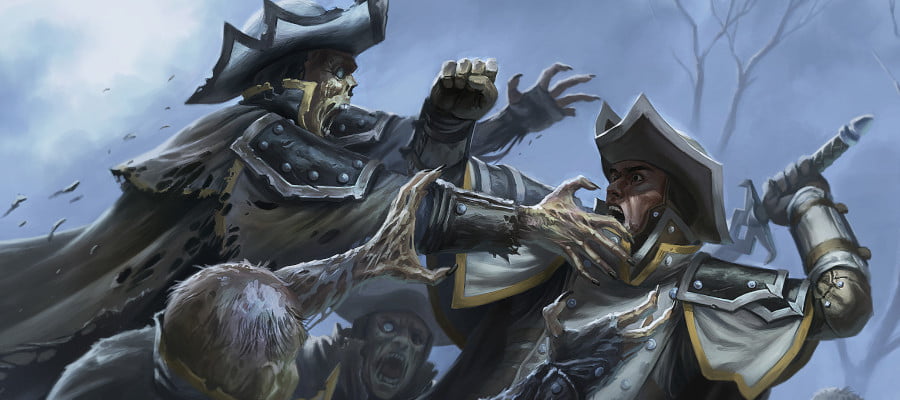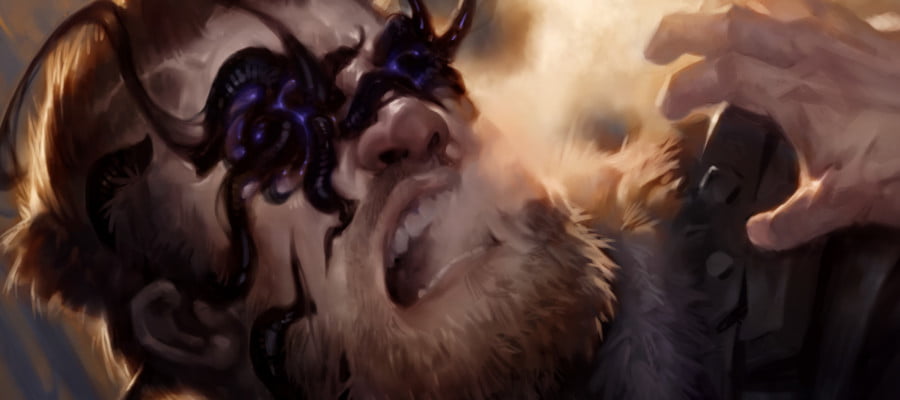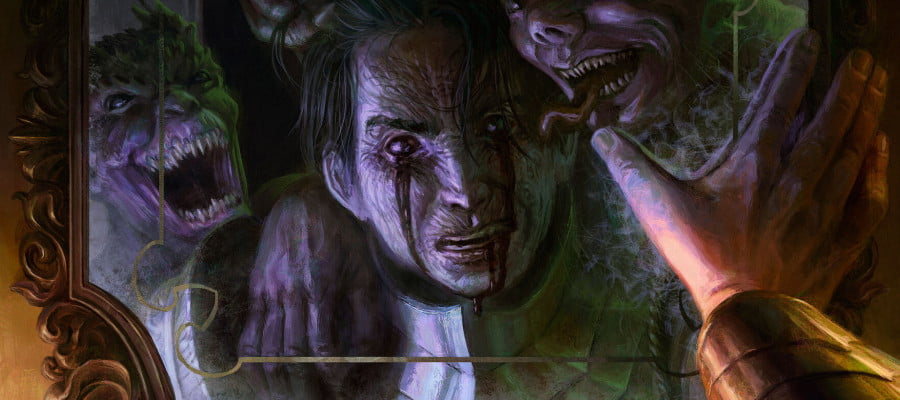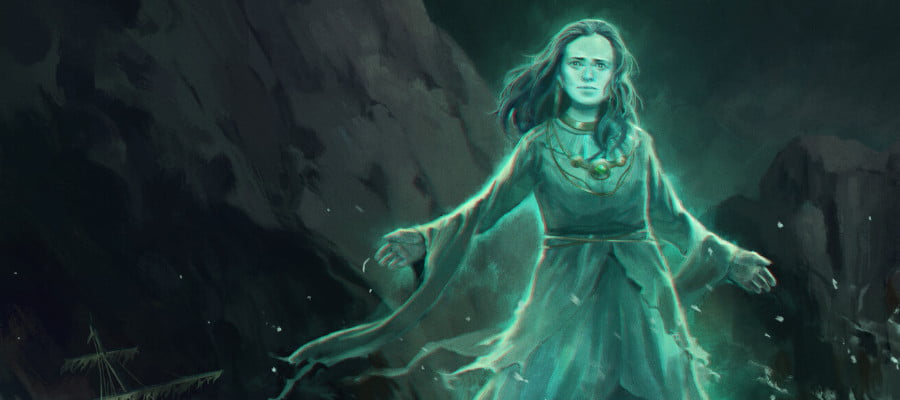One of the common problems present in any given Dungeons and Dragons campaign, set in the context of a world of adventure, mystery and combat-ready quarrel-solvers, is anyone ever asking the question ‘can’t someone else do it?’
For a whole host of problems, this is simply true: Yes, someone else can do it. In a world with guilds and support and highways and organisations, there is by definition almost always someone else on hand who can do the job, and most often, the players are the ones with a combination of opportunity and happenstance to be the ones dealing with this problem, right now.

There are tricks for it, of course. Chanting. Destiny. Magical artifacts that fuse themselves to your skin. Hypnotists. Walkie-talkies, tempers, fists – but not so fast.
What I’d like to suggest is an idea for a campaign style that fixes this problem, gives you a tone and introduces a reliable tool for the DM to weave into the story: Make it cursed.
What I’m talking about is something where your group of player characters, and just them (or maybe one or two side NPCs, whatever), are afflicted with a terrible curse, or haunted by a ghost of some variety. That is to say, there is some unique, negative, persistent effect with a persona attached to it, that the player characters have a reason to want to shed, but which also presents a constant and recurrent problem for them.
This offers a solution to three common problems in a tabletop campaign; one of Motivation, one of Opportunity, and one of (snort, sniff) Ideology.
The Curse As Motivation
There’s a transactional mindset to a lot of D&D settings. Most settings have multiple adventurers in them, players often are made to feel like they’re connected and part of communities. It makes sense – if you have enough +1 swords that there’s a standardised price, there’s clearly a demand for them, and that demand is capable of commanding some pretty ridiculous prices. There needs to be some economy of these things.
The problem that follows from that is that any time players encounter anything that’s too hard for them, there can be a question – usually voiced out of character, because people know it kind of ruins the fun – to ask ‘why don’t we hire other people to do this for us?’ as if everyone knows that Adventure Landlords is a possibility when you have enough money, but also that it obviously sucks. Even just hiring people who are a little bit less strong than them will help defray the potential problems, and time and bodies are two of the most valuable things you can bring to these kinds of adventure problems.
Any ideologically inclined party is going to ignore this problem; they want to solve the problem because they have some other motivation. But the business-minded, prosaic and practical adventurers have no reason to just let that happen the way it was going. If you want to keep the group together, the curse means that every member in it has something to hold them together and some common component of the campaign they want to resolve.
When the party is cursed, then the problem that they’re encountering is isolated to them. Nobody else walking into this location has ghosts crawling out of the walls, you can’t hire someone else to resolve the demon that’s drawing runes on the walls when you go a full day without shedding blood. It’s your problem, as a group.

Curses as impetus
Obviously, when you’re cursed, you want to deal with the curse, right?
The curse presents a thing to drive the story along and to present scenarios for the players to deal with. On the one hand they may want to resolve the curse itself, but it may be something they have to resolve while other events are happening. Sure, you may have a curse from an ancient mansion, but what do you do if when you get back, that mansion has been blockaded by an army using it as a barracks because now there’s a border dispute? To get back into the mansion and reconcile with the curse, you’re going to have to find a way to get past that army, or fight through it – that kinda thing, right?
The curse as this recurrent problem pulling you forward means that any smaller scope problems you do can be seen in light of their application (or hypothetical application) to the curse. Rescuing a scholar who’s missing because they might be able to shed some light on the curse makes every side quest inherently valuable to the greater situation. A need for sleep makes stealing bottles of stored rest from the Sensates, and so on. And that also means any time you, the DM, need to come up with reasons for why people should care about the kinds of tasks you have in mind, you can always use the curse to enact them.
This also can play into the uniqueness angle. The curse can be used to transform locations; an abandoned ruin that everyone else can move through freely, but which is populated with cursed ghosts that can see the players because of their curse, then you get to have locations and zones as encounters for your players that doesn’t require them to spend their time diving into dungeons, which plays into the next idea, which iiiis…

Curses showing ideology
Why, in your setting, might someone, or a group of someones be cursed? What ideology does the curse reflect, that the players are literally fighting every step of the way? Is the curse a punishment for something that they actually did wrong, and they need to learn about that, come to terms with it, and understand the perspective of the curse?
Or is it much simpler, that the curse is something unreasonable done by someone who’s a dick, and therefore, the whole point of rebelling against it and fixing it is an act of rebellion against a mindset that’s long since passed relevance?
The thing with the curse is that it’s an enacting of power for a reason. It’s not like radiation, it’s not a poison, it’s something that’s being done because a person or people want it to happen, and therefore, you can use the curse to represent those people’s wants. It can come with rules that players adjust to to live, like food restrictions or weird habits or rituals that are meant to show them what it’s like to live in the behest of someone else’s ideology.
You need to make sure though tht the curse doesn’t become ‘the DM says no.’ You can do that if you stick to the idea that the curse isn’t trying to make the players do a particular thing but rather trying to make them live a particular way. Punish them for violating a set of rules, but don’t lead them down a path.

Okay But How Do I Do It?
You can do this with a couple of general vibes, with varying degrees of diceyness. You can use a curse on an ancient artifact or ruin, something like the players in the initial, exploratory stage of things, tripped some trap or violated some rule of an ancient culture and were cursed by the ancient engines there. This is probably the diciest because uhhh, a lot of the stuff around ‘ancient civilisations with inscrutable motivations’ stories get real racist real fast. Bear that in mind when you wield that trope.
Another option is some ghost or actual sapient undead that has a reason to hate the players, like they intruded in its resting place or the place. This tends to play into ideas of the dead and privileged, and don’t often need the same time scale as other severe versions of it; even just a few generations back, you can have people who are more or less like us now, in places more or less like we have now and that can remove problems like a language barrier (if you don’t want it) or vast cultural distance. It’s one thing to have a curse visited on a cool party of rad queer adventurers because the person inflicting it is a homophobic grandpa, but it’s a lot weirder if that person is from a society that predates even our idea of the invention of homosexuality.
There’s also some kind of outsider, inhuman force, like a demon or folk monster or cryptid style arrangement, where thanks to some choice or mistake the players made, they are now ensnared in the attention of something outside of their experience that is also, importantly, not material in the conventional way. This is your Silent Hill stuff, where the whole world can get a bit unreliable as players push their way through what they’re experiencing. This is important to make sure you’re playing with the spaces and not the perceptions though – after all, if the players are all having mind-fights with crystal jesus in purgatory, it loses the ability to focus on the story as players working together.
An idea that’s really worth stealing from the lore of Odinsphere and the lesser-well-known Pirates of the Caribbean is the idea of cursed coins. This makes it something players have a reason to care about and interact with, a reason to make a believable mistake, and then a reason to go on an elaborate quest to restore them.
Hopefully this is some ideas for ways to make the dramatic theatrics and the brooding warriors of your D&D parties happy in different ways.